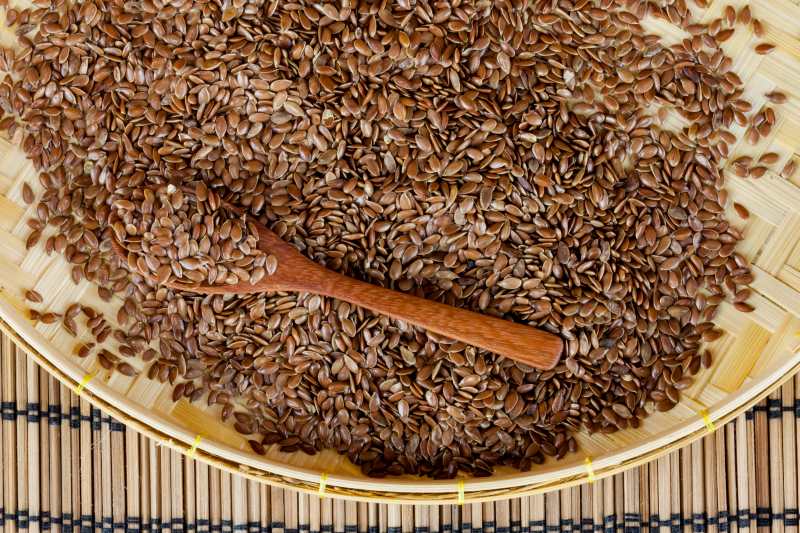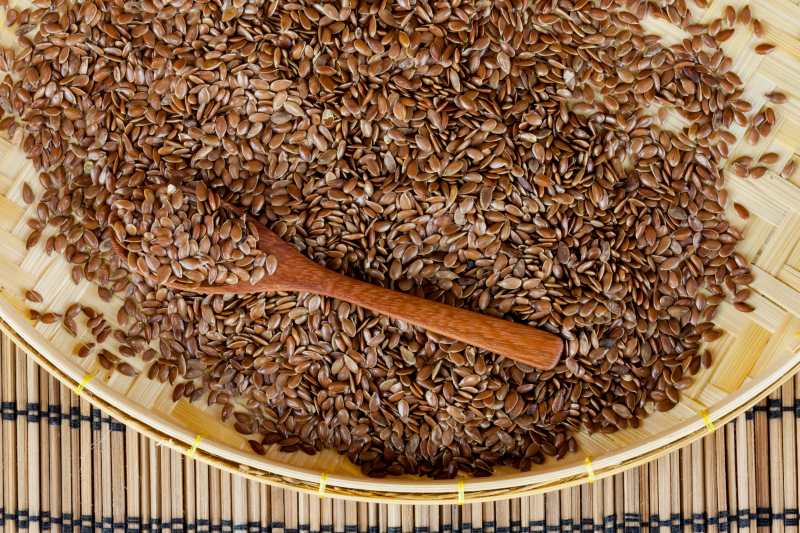Take a look at the possible health benefits of flaxseed:
1. Lowers the Risk of Cancer
Consumption of flaxseeds may stop the growth of the multiple types of cancer cells in the body. Besides, they consist of lignans. These antioxidants reduce the tumour's growth and prevent them from making new blood vessels.
2. Improves Heart Health and Reduces Bad Cholesterol
The American Heart Association suggests consuming more omega-3 and fibre to improve heart health. Besides, the consumption of lignans may also prove beneficial in preventing cardiovascular diseases. Thankfully, flaxseeds have all these nutrients. Moreover, these superfoods contain phytosterols. Phytosterols help in preventing cholesterol absorption in the intestine. Therefore, consuming flaxseeds may lower the LDL (low-density lipoprotein) levels or, as popularly termed, 'bad cholesterol' in the body.
3. Reduces the Symptoms of Arthritis
According to the Arthritis Foundation, consuming flaxseeds may decrease joint stiffness and pain. Individuals with lupus, Raynaud's phenomenon and rheumatoid arthritis can consume these seeds to get some relief from pain. Although, according to the Foundation, there is no sufficient evidence to support this claim. However, the ALA content in the flaxseeds may lower the inflammation.
4. Improves Blood Sugar
Flaxseeds may control blood sugar levels. This is because the seeds are rich sources of insoluble fibre. Fibre takes a long time to break down and digest. This, in turn, lowers the release of sugar in the blood. A majority part of their insoluble fibre constitutes lignans. These are a group of polyphenols and are extremely beneficial for maintaining blood sugar levels.
5. Prevents Constipation
The insoluble fibre content in the flaxseeds does not allow them to dissolve in the water. Instead, they stay in the digestive tract after consumption. Over there, they absorb the water and create a bulk that promotes regularity in the bowel movement.
6. Helps in Weight Management
According to a study published in 'Healthline’, a drink containing flax fibre tablets with 2.5 grams of soluble fibre lowered feelings of hunger and reduced the overall appetite. This is due to the presence of soluble fibre in them that slows down digestion and boosts the feeling of fullness. This is very helpful in managing weight.
7. Maintains Blood Pressure
The presence of lignans and alpha-linolenic in flaxseeds prevents the increase of blood pressure levels. Besides, they are rich sources of fibre which protect the cells in blood vessels and control the blood pressure levels.
8. Rich in Omega-3 Fatty Acids
Flaxseed is an excellent source of alpha-linolenic acid (ALA), an omega-3 fatty acid crucial for heart health. Omega-3s help reduce inflammation, lower the risk of chronic diseases such as heart disease, and support brain function. Consuming flaxseed can help balance the ratio of omega-6 to omega-3 fatty acids in the diet.
9. High in Dietary Fibre
Flaxseed is packed with soluble and insoluble fibre, making it an excellent choice for digestive health. The soluble fibre in flaxseed helps regulate blood sugar levels and lower cholesterol, while the insoluble fibre promotes regular bowel movements and prevents constipation. Additionally, fibre supports a healthy gut.
10. Supports Hormonal Balance
Flaxseed contains lignans, which have phytoestrogenic properties that can help balance hormone levels in the body. For women, flaxseed can alleviate symptoms of menopause, such as hot flashes and mood swings. For men, lignans can support prostate health and reduce the risk of hormone-related conditions.
11. Enhances Skin Health
The omega-3 fatty acids and antioxidants in flaxseed can contribute to healthier skin. Omega-3s help maintain the skin's lipid barrier, keeping it hydrated and reducing inflammation that can lead to conditions like acne and eczema. Antioxidants protect the skin from damage caused by free radicals and UV radiation.
12. Reduces Inflammation
Chronic inflammation is a root cause of many health conditions. The nutrients in flaxseed have anti-inflammatory properties that can help reduce inflammation in the body. By lowering the levels of pro-inflammatory markers, flaxseed can alleviate symptoms of inflammatory conditions and improve overall health.
13. Supports Bone Health
Flaxseed contains several essential nutrients for maintaining strong and healthy bones, including calcium, magnesium, and phosphorus. These minerals work together to support bone density and prevent conditions like osteoporosis. Regular consumption of flaxseed can reduce the risk of fractures.
14. Promotes Healthy Hair
The nutrients in flaxseed, including omega-3 fatty acids, vitamin E, and protein, can support healthy hair growth and maintenance. Omega-3s nourish hair follicles, promoting stronger and shinier hair. Vitamin E acts as an antioxidant, protecting hair from damage caused by environmental factors and free radicals.
15. Enhances Mental Health
Flaxseed plays a crucial role in maintaining the structure and function of brain cells, improving cognitive function and reducing the risk of neurodegenerative diseases. They also help regulate mood and reduce symptoms of depression and anxiety. Regular consumption of flaxseed can enhance overall brain health.
16. Aids in Detoxification
Flaxseed can support the body's natural detoxification processes. Fibre helps bind and eliminate toxins from the digestive tract, promoting regular bowel movements and preventing the reabsorption of harmful substances. Including flaxseed in your diet can aid in maintaining a clean and healthy body.
17. Supports Respiratory Health
Flaxseed's anti-inflammatory and antioxidant properties can benefit respiratory health by reducing inflammation in the airways and protecting lung tissue from oxidative damage. Omega-3 fatty acids help manage conditions like asthma and chronic obstructive pulmonary disease (COPD) by improving lung function and reducing the frequency of symptoms.






















